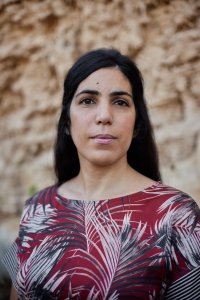Naama Grey-Smith

Naama Grey-Smith is an editor, publisher, writer, and critic based in Fremantle/Walyalup, Western Australia. She holds degrees in communications and publishing and has edited award-winning fiction and non-fiction. Her enduring interests are language, memory, and place.
Hilde Hinton’s début novel is character-driven storytelling at its best. Its narrator, Susie, is a perpetual outsider whose world comprises ‘her dad, her crazy sometimes-there mum and a house that didn’t look like the others’. Susie faces life’s brutal realities earlier than most: by Year Seven she has moved from the country to the city, taken up selling newspapers in Melbourne’s stre ... (read more)
With Wolfe Island, Lucy Treloar joins a growing number of novelists whose fiction is marked by anthropogenic catastrophe. Her latest offering confronts two urgent global crises: the climate emergency, and the plight of refugees. Treloar reveals startling connections between the two through the shared thread of displacement in a work that is more than powerful: it’s transformative.
Treloar’s s ... (read more)
The first thing one notices about Jaclyn Moriarty’s Gravity Is the Thing is its narrative voice: distinctive, almost stylised. Exclamation marks, emphasised words in italics, a staccato rhythm, and clever comments in parentheses add up to a writing style sometimes deemed quirky. This style is not restricted to the voice of the first-person narrator but rather is a lens through which the work and ... (read more)
At the front of Miriam Sved’s A Universe of Sufficient Size is a black-and-white photograph of a statue. The cloaked figure holding a pen (‘like a literary grim reaper’, reflects one character) is the statue of Anonymous in Budapest, a significant setting in the book. Its inclusion is a reminder that the novel draws on the story of the author’s grandmother, mathematician Marta Sved (née W ... (read more)
Gravity Well opens with Carl Sagan’s famous ‘mote of dust suspended in a sunbeam’ quote, suggesting themes of astronomy, loneliness, and humanity’s cosmic insignificance. Though I was immediately smitten with the cover design (a nebula-coloured orb, its top and bottom halves depicting mirrored but not identical female silhouettes amid a sea of cosmic black), I worried that the novel might ... (read more)
Compelling from start to finish, The Healing Party is a mature and illuminating account of the complex ties of family. Micheline Lee's début novel follows Natasha Chan who, after years of estrangement from her family, receives news of her mother's terminal cancer. Natasha leaves her life in Darwin and returns to the family home in Melbourne. Here, the Chans – who became born-again Charismatic C ... (read more)
'Freg nisht dem royfe, freg dem khoyle – Don't ask the doctor, ask the patient,' my grandmother says in Yiddish, one of eight languages at her disposal, having grown up in Europe during World War II and migrated as a teenager to the multilingual melting pot of Israel. I smile and ask her for another gem. My grandmother obliges, this time with a juicy-sounding Bulgarian phrase with a similar mean ... (read more)
Set in Melbourne’s cafés, under its bridges, behind its laundromats, and within its zoo, Leap is a contemporary Australian novel about love and loss. It entwines the narratives of Joe, whose guilt over the accidental death of his high-school girlfriend drives him to work dead-end jobs and train furiously in the art of Parkour, and Elise, a recently separated graphic designer who finds clarity i ... (read more)
What makes a person useful? What gives them worth and value in the world? And who gets to decide? These are some of the questions Debra Oswald explores in Useful, a novel set in suburban Sydney.
... (read more)
